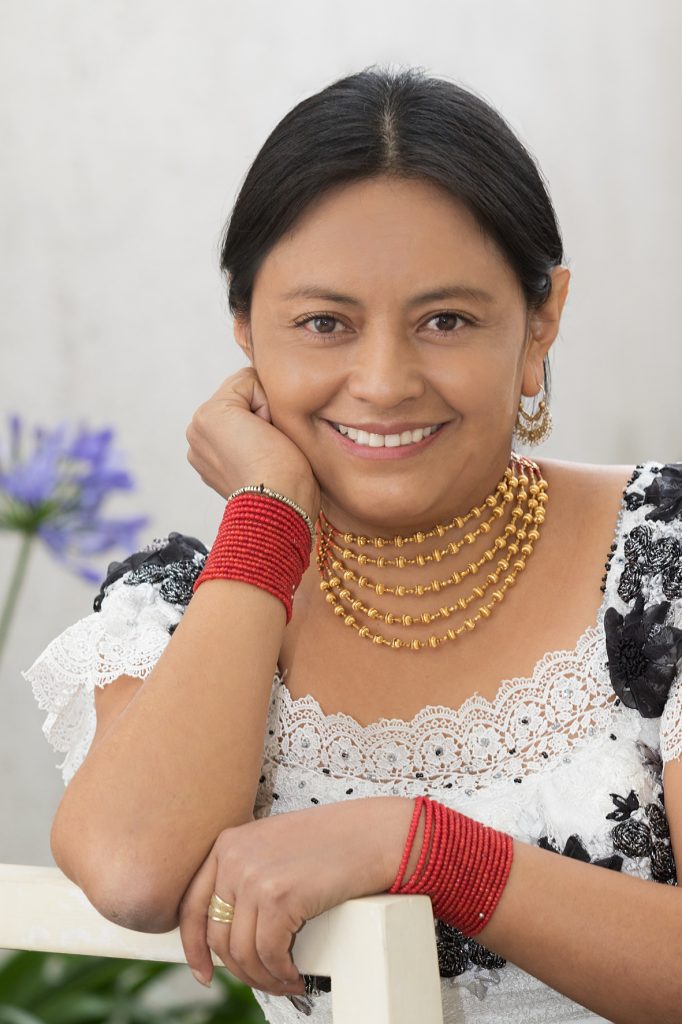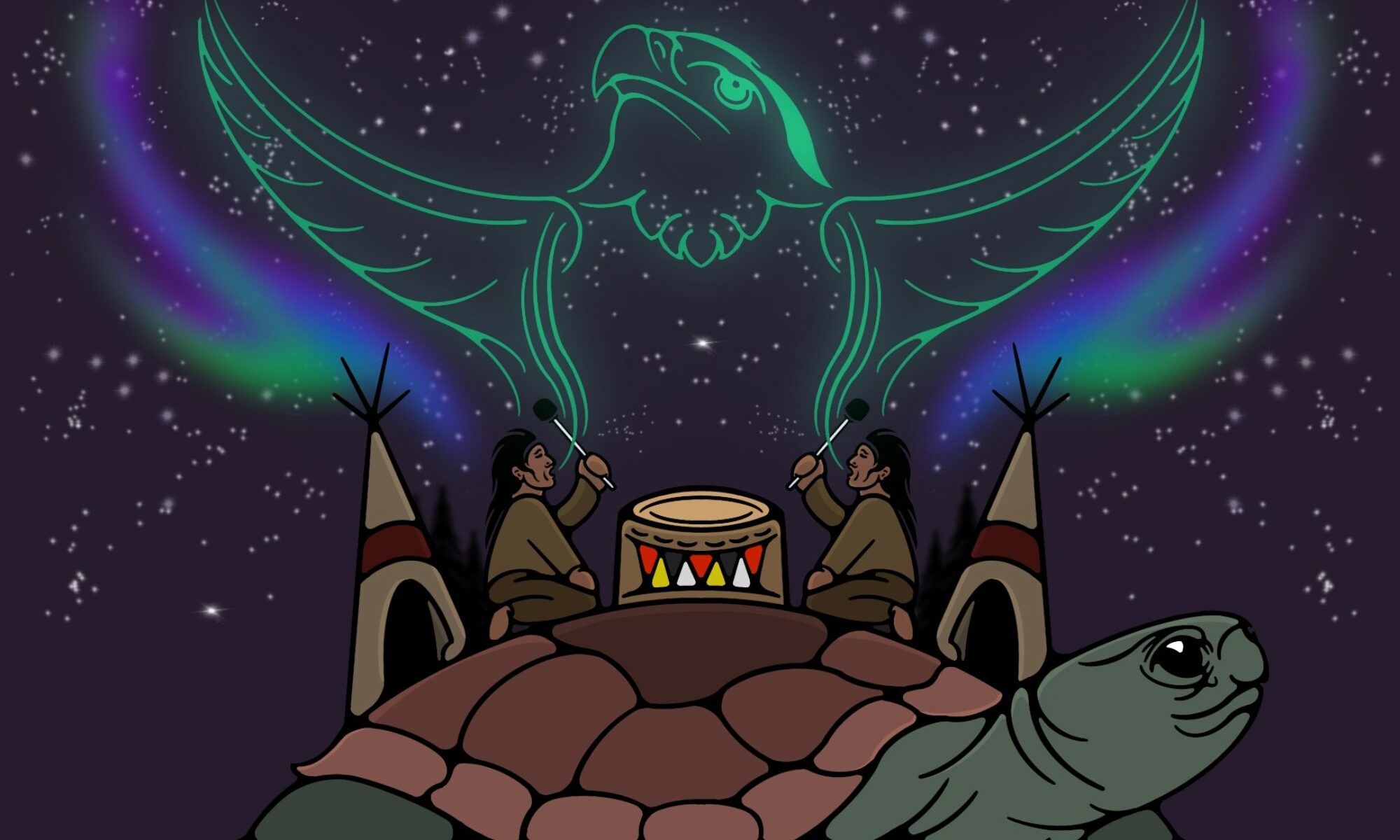
About the author:
Yana Lucila Lema studied Social Communication with a specialization in Television at the Central University of Ecuador. She also studied Creative Writing and received a Masters of Social Sciences with a concentration in Indigenous Issues at FLACSO. She obtained a degree in Audiovisual Journalism at the Jose Marti International Institute of Journalism in Cuba. She has collaborated with indigenous organizations such as the Confederacy of Ecuadorian Indigenous Nationalities (CONAIE), the Confederacy of Indigenous Nationalities from the Ecuadorian Amazon (CONFENIAE), and the Confederacy of Peoples of Kichwa nationality (ECUARUNARI).
In her work with CONAIE she created several videos about strengthening cultural identity among indigenous peoples. One of these videos, which focused on traditional medicine, was the winner of the First Nations of Abya Yala Film Festival. She was presenter for the Kichwa language newscast KICHWAPI for six and a half years on the national channel RTS. As a writer, she participated in the International Meeting of Indigenous Communicators and Writers in Indigenous Languages (UNAM-Mexico), the Conference of the Association for Writers in Indigenous Languages of Mexico, and the International Poetry Festivals of Medellin and Bogota (Colombia). Her poetry was included in the book Las palabras pueden: Los escritores y la infancia (UNICEF), the poetry anthology of indigenous nations of Ecuador Ñaupa pachamanta purik rimaykuna / Antiguas palabras andantes (Casa de la Ecuatoriana 2016), and in the special edition of the Diálogo Magazine “Los cinco puntos cardinales en la literatura indígena contemporánea/ The five cardinal points in contemporary indigenous literature” (DePaul University 2016). Currently, she works as a professor in the University of the Arts in Guayaquil.
Tamyawan Shamukupani is the first collection of Quichua poetry by Yana Lucy Lema. Her poetry is very intimate, sensual and connected to her Otavalo heritage and the cosmos in general. She does that with few strokes, as if she was talking to someone, usually a loved one. Hers is a new voice in Quichua poetry, going beyond the usual rhetoric. The translations were done relying primarily in the original Quichua version, and might be slightly different than the authors translation into Spanish. We have also segmented the stanzas to allow the nonlinear symbolic flow between the lines. If the translator is familiar with the native language this is the right way to approach a text, so the nuances are not lost in the intermediate language. Thanks to Robert Roth, director of And Then Magazine, for Reading and suggesting some fine tuning for this wonderful body of work. (by Fredy A. Roncalla)
Tamyawan Shamukupani /Living with the rain
1
chay lusiru kimirimukunmi
kintikunapash ña pawanakunmi
pakchata yallik ñuka shunkupash wakakunmi
chay kanpa shimiwan allpata mutyachishami
wayrapash ñukanchikwan pukllachun sakishunlla
-ama manchaychu
nachu urkukunapash kuyarinmi
nishpami ñuka mamaka- nin
1
Morning star comes by
and the hummingbirds fly around
my heart roars louder than a waterfall
I will water the earth with your lips and mouth
It is time for the wind to play with us
do not fear:
even the mountains
love each other
my mother said
2
ñawpa mamakunapa makikunapi
katik wawakunapa makikunapi
uchilla ninakunashinami
puka mullukunapash
cuentakunapash punchalla rikurinakun
inti llukshinkakaman
inti washakunkakaman tushunka
shunku kushikuchun
kutinpash pukuchiyta ushankapak
2
At the hands of the elder women
and the young ones that follow them
shine golden mullu* shells
like small suns
the silver beads will dance
until sunrise
and sunset
bringing happiness to our hearts
so they flower again
*Mullu is the quichua mane for the spondylous shell. This shell is used in many rituals in the Andes and had an exchange value close to money in pre-Hispanic times. This shell is widely used in the manufacture of beads in the coastal region of Ecuador and Peru. This poem refers to the importance of handcrafting in quichua communities.
3
kunanka ñukawan
ñuka ñawi rikuypi tiyakuy
kanpa maki awayta rikukusha
nachu hawapachapi nina puchkakunapash watarinakun
nachu paykunallatak uchilla ninakunata
ñukanchik shunkukunatapash watachishka
3
Stay now
looking at me in the eyes
I will watch your hands
as if they were weaving threads of fire at Hawa Pacha*
those hands
perhaps the only ones tying small suns**
for our hearts contentment
*”Hawa pacha” is the celestial dimension in Quichua cosmology.
**”Tying small suns” refers to the capacity to tie a celestial body –usually with a woolen cord- to benefit the realm of this world.
4
kayna puncha
kayna chishi
kayna tuta
ñuka shuti kanpa shimipi
kanpa llakta ñuka ñawipi
ñawpa ñawpa punchakuna purishkami kashka
ñukanchik makikunapi hapirishka munay
ñukanchik llaktakunamanta makanakushpa puriwan paktay
chay puncha
chay chishi
chay tuta
kanpa shuti ñuka shimipi
ñuka llakta kanpa ñawipi
ñawpa punchakuna purishkami kashka
chiri wayra chawpipi ukllariy
aycha ukupi chay tukuy makanakuykunawan paktay
kunan puncha
kunan chishi
kunan tuta charichishkaka
ñuka llaktapi kan chulunlla
kanpa llaktapi ñuka chulunlla
kunan kunan purishkami kan
uchilla ninakunalla tutapi
shuk makanakuykunapash ñukanchikta tarimushkami
kanta ñukata ñukanchikpa chikan llaktakunapi
4
Yesterday
last evening
the night holding
my name in your lips
and your land in my eyes
come from very old times
like a certain tenderness left in our hands
by the struggles for our people
the other day
and evening
that night holding
your name in my lips
and my land in your eyes
are a more recent story
just like a hug in the middle of the cold wind
blowing with the struggles we carry in our blood
today
this evening
and the night still holding
your silence in my land
and your land in my silence
are even a smaller tale
like a night with small suns
guiding our future struggles
for our lands
5
kan ñuka suni akchata llampuchishkata yarinirakmi
ñuka rinripi
kanpa uchilla wankarpash wakakunrakmi
5
I have your hand going through my hair
and in my ears
the sound of your small drum
6
suni akchayuk
raymi kushma churakushka mamakulla
chishikunapi kanta shuyanchik
—ñanta mañachiychik yallipasha— nishpa purimuy
—yallipay mama yallipay— nishpa chaskishunmi
wawakunaman kushikuyta
kanpa mishki shimita apamupay
imashina sisakuna pukuchun tamyata shuyanchik
shina kantapash shuyanchikmi
shamuy sumak tullpukunayuk
kawsak rumikunayuk mamakulla
6
Venerable old lady
long haired lady
Dressed like you are going to the town celebration:
we wait for you
as the evening sets
just come and say “I am passing by your place”
we will answer “just pass, madam, just pass”
bring your sweet words and happiness
for the infants
we wait for you as the flowers long for the rain
just come, old lady
with your beautiful colors
and your stones full of memories
MORE ABOUT YANA LUCILA LEMA

About the translator:
Fredy A. Roncalla was born in Chalhuanca, Apurimac, Peru in 1953. He has studied linguistics and literature, in addition to a long journey in Andean Studies, with a special focus on aesthetic elements. He is also a handcraft artist who works with recycled materials. He has published poetry and essays in diverse online and printed publications.
He is the author of Canto de pájaro o invocación a la palabra (Buffon Press, 1984); Escritos Mitimaes: hacia una poética andina postmoderna (Barro Editorial Press, 1998); Hawansuyo Ukun words (Hawansuyo/Pakarina Ediciones, 2015); and Revelación en la senda del manzanar: Homenaje a Juan Ramírez Ruiz (Hawansuyo/ Pakarina, 2016). He is currently working on Llapan llaqtan: narrativa y poesía trilingüe/ Llapan llaqtan: trilingual poetry. His trans-Andean projects can be found in the virtual ayllu: Hawansuyo Peruvian Bookstore, Churoncalla.com, y Hawansuyo.com
